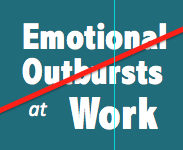 Unfortunately, the majority of us have either had to deliver an unpleasant message or receive one. It’s not fun. In fact, we’re probably all familiar with the emotions that can well up within us in those situations.
Unfortunately, the majority of us have either had to deliver an unpleasant message or receive one. It’s not fun. In fact, we’re probably all familiar with the emotions that can well up within us in those situations.
Leaders who strive to cultivate a culture of integrity, trust and respect (presumably all leaders) consciously engage in self-regulation when encountering conversations and situations that are stressful.
The good news is that while some of us are naturally more emotionally impulsive, we can all learn to understand and recognize our emotions so that we improve our ability to monitor and control our own behavior, emotions, or thoughts, and adjust them according to the demands of the situation.
Leaders who consciously self-regulate are more effective. Self-regulating leaders don’t generate distrust and disloyalty – resulting in higher employee turnover and a generally less productive work force. I call this making “conscious conflict choices.”
Here are some tips for mitigating emotional outbursts and consciously engaging in self-regulation:
- Pause for Perspective — The pause is what helps give us a moment to work through the “fight or flight” chemical reaction that gets triggered in stressful situations.
- Be Curious — Ensuring we’ve heard and understood what the intended message is by asking questions is another tool to assist in self-regulation.
- Avoid Character Attacks — In the workplace, it’s perfectly appropriate to stand up for a different point of view, but not at the expense of others, or for the purpose of humiliating them. Personally attacking another does nothing to resolve conflict. In fact, it generally creates negative perceptions on both sides. Respect the person, even if you disagree with their point of view or don’t like their behavior.
